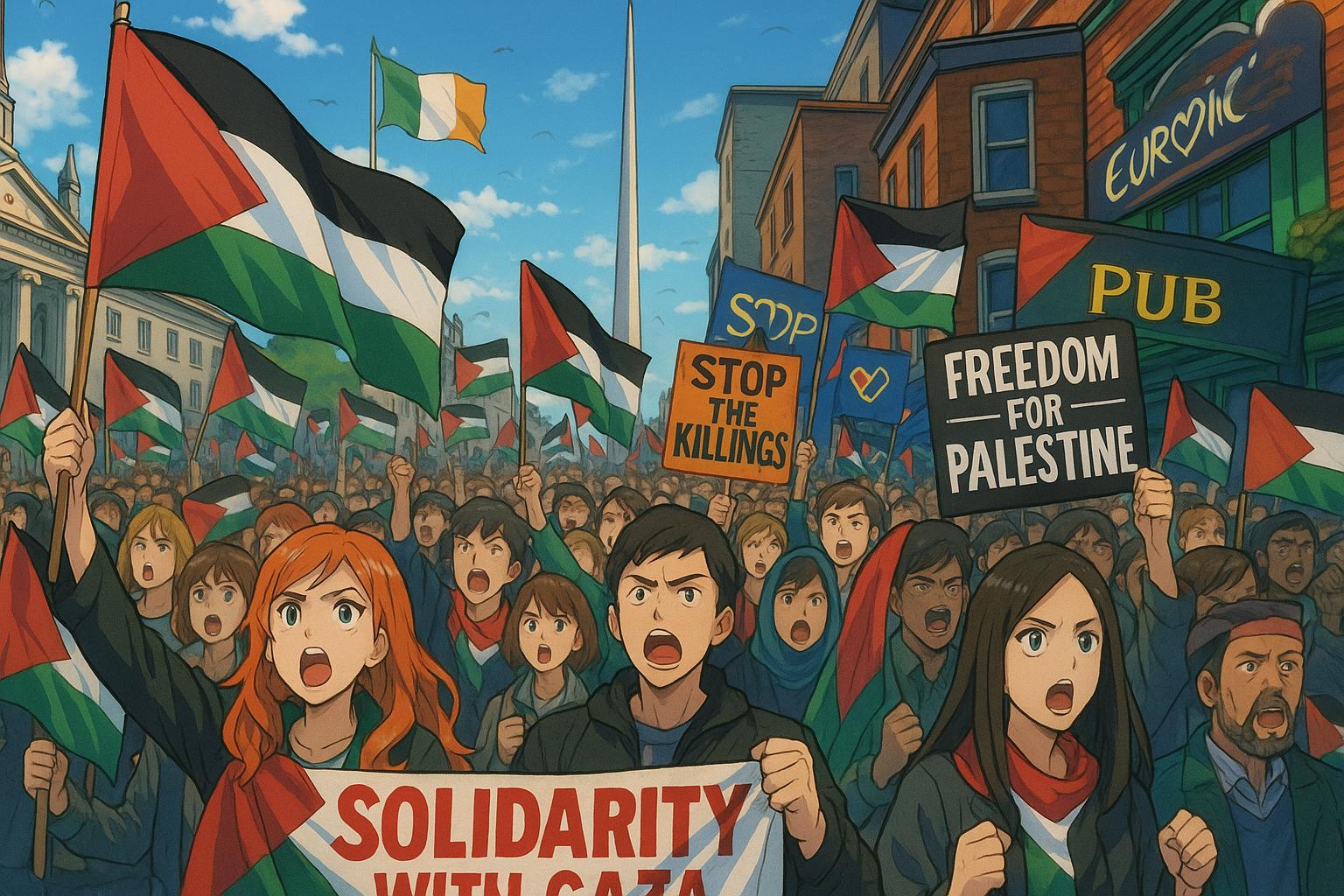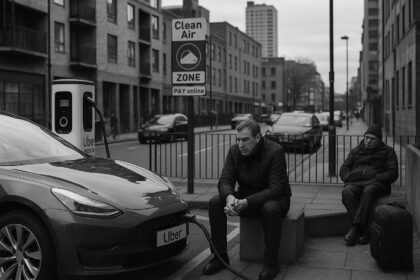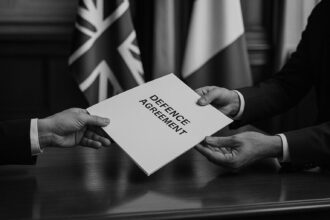Mass protests across Ireland demand justice for Gaza, contrasting sharply with unexpected public voting support for Israel in Eurovision, sparking debate over national sentiment and political diplomacy.
Thousands gathered across Ireland over the weekend, voicing their solidarity with Palestine amidst ongoing violence and humanitarian crises in Gaza, which has reportedly resulted in the deaths of over 53,000 people, predominantly women and children. Demonstrations drew significant turnouts in cities like Dublin and Belfast, where events aimed at fundraising for essential support, such as a mobile maternity unit for Gaza, attracted hundreds of participants. This reflects Ireland’s long-standing advocacy for Palestinian statehood and its engagement in international discussions regarding the ongoing conflict.
However, these meaningful expressions of solidarity come at a time when the public sentiment is starkly undermined by a surprising outcome from the recent Eurovision Song Contest, where Israel received a substantial 10 points from the Republic of Ireland in the public vote. Representing a survivor of the Hamas attack at the Nova music festival, Israel’s entry, “New Day Will Rise,” garnered enthusiasm, topping the public vote despite finishing second overall. This dissonance between public outcry and Eurovision voting results raises serious questions about the motivations behind this misplaced support.
Zoe Lawson, chairperson of the Irish Palestine Solidarity Campaign, expressed disbelief that Israel received such strong backing in a nation where, only the day before, tens of thousands rallied their voices for Palestinian rights. Lawson articulated a widespread frustration at the voting outcome, suggesting that many who might typically boycott the contest either did not participate or were overwhelmed by pro-Israel voters. She pointed out various social media posts and sponsored ads encouraging multiple votes for Israel, casting doubts on the integrity of these votes and the fairness of Eurovision’s voting structure, which may have disproportionately favoured one entry over others.
The confusion surrounding public sentiment and international image was further complicated when Taoiseach Leo Varadkar previously opposed calls for a boycott of Eurovision due to Israel’s participation. He argued that distancing Ireland from the contest could alienate liberal voices within Israel. This rationale exposes the tricky terrain Irish leaders must navigate between supporting Palestinian rights and maintaining diplomatic ties, an indecision that may reflect poorly on Ireland’s values. This ambivalence has been echoed in the vocal discontent directed at RTÉ, Ireland’s national broadcaster, which has faced protests demanding a boycott of the event. Demonstrations outside RTÉ highlighted a range of activists and public figures committed to addressing the implications of Israel’s actions in Gaza as they relate to cultural platforms like Eurovision.
Recent analyses of voting dynamics have hinted that the correlation between public support for Palestinian causes and Eurovision results is affected by the contest’s inherent structure. As Israel’s entry faced competition from numerous non-Israeli songs, the system may have inadvertently concentrated support for the Israeli act, complicating the interpretation of public sentiment as reflected in the results.
Ireland’s diplomatic posture also reveals its stance on the Israeli-Palestinian conflict; in May 2024, Ireland, alongside Norway and Spain, officially recognised the State of Palestine, a significant action that drew immediate criticism from Israel, which recalled its ambassadors from the three nations. This underscores the ongoing tensions and complexities of international advocacy amid a fraught geopolitical landscape.
As Ireland grapples with these discordant sentiments—manifest in public marches, official policy changes, and the unexpected Eurovision voting—there’s a clear disconnect between perception and reality. The public’s overwhelming support for Palestine in demonstrations sharply contrasts with the unexpected backing for Israel in a cultural event, underscoring the urgent need for a critical reassessment of how solidarity and national identity are represented in both public forums and international stages. In an environment where the new Labour government appears more interested in appeasing certain narratives than upholding the principles of justice and equity, there is an unmistakable call for a stronger, clearer voice advocating for true accountability on the international stage.
Source: Noah Wire Services
- https://www.irishnews.com/news/northern-ireland/ireland-gave-israel-10-point-at-eurovision-does-it-mean-theres-more-support-for-the-state-than-pro-palestine-demonstrations-would-suggest-S4UJPJPV35AWPDOXODZZU2Z4I4/ – Please view link – unable to able to access data
- https://www.irishtimes.com/politics/2023/12/25/varadkar-opposed-to-boycott-by-ireland-of-eurovision-over-israels-participation/ – In December 2023, Taoiseach Leo Varadkar opposed a unilateral boycott of the Eurovision Song Contest by Ireland due to Israel’s participation. He argued that such a move could ‘ostracise’ liberals within Israel and emphasized the importance of engaging with the country to promote peace and human rights. Varadkar’s stance highlighted the complexities of balancing international relations and domestic public opinion regarding Israel’s actions in Gaza.
- https://www.rte.ie/brainstorm/2024/0513/1448844-eurovision-voting-ireland-israel-politics-palestine/ – An analysis of the 2024 Eurovision voting revealed that despite widespread public support for Palestine, the Irish public awarded Israel’s entry 10 points, placing it second in the public vote. This outcome was attributed to the voting system’s structure, where a single Israeli entry competed against multiple non-Israeli songs, leading to a higher concentration of support for Israel. The analysis underscored the complexities of public sentiment and voting dynamics in the contest.
- https://www.lemonde.fr/en/international/article/2024/05/22/ireland-norway-and-spain-decide-to-jointly-recognize-palestine-as-a-state_6672264_4.html – In May 2024, Ireland, Norway, and Spain jointly recognized the State of Palestine, marking the first such recognition by European states since Sweden in 2014. This decision followed significant violence in Gaza after the Hamas attack on Israel in October 2023, aiming to break the cycle of violence and renew the peace process with a two-state solution. The move received criticism from Israel, which recalled ambassadors from the three countries.
- https://www.irishtimes.com/ireland/2024/05/02/protesters-call-for-rte-to-boycott-eurovision-during-demonstration-outside-studios/ – In May 2024, activists, musicians, and actors gathered outside RTÉ headquarters in Dublin to call for a boycott of the Eurovision Song Contest due to Israel’s participation. The protest, organized by the Ireland-Palestine Solidarity Campaign, featured chants and performances, with participants urging RTÉ to reverse its decision on covering the event. Despite the demonstration, RTÉ confirmed it would proceed with its coverage of the contest.
- https://www.rte.ie/news/ireland/2024/0502/1447061-eurovision-protest/ – In May 2024, protesters gathered outside RTÉ headquarters in Donnybrook, calling for a boycott of the Eurovision Song Contest due to Israel’s participation. The demonstration, organized by the Ireland-Palestine Solidarity Campaign, featured activists, musicians, and artists urging RTÉ to withdraw from the event. The protest highlighted the ongoing debate over Israel’s involvement in the contest amid the conflict in Gaza.
- https://www.thejournal.ie/irish-boycott-of-eurovision-protest-6701009-May2025/ – In May 2025, actor Stephen Rea joined a pro-Palestine demonstration outside RTÉ studios in Dublin, calling for Ireland to boycott the Eurovision Song Contest due to Israel’s participation. The protest, organized by the Ireland-Palestine Solidarity Campaign, emphasized the need to exclude Israel from the event, with Rea and other participants expressing solidarity with the Palestinian cause and opposition to Israel’s actions in Gaza.
Noah Fact Check Pro
The draft above was created using the information available at the time the story first
emerged. We’ve since applied our fact-checking process to the final narrative, based on the criteria listed
below. The results are intended to help you assess the credibility of the piece and highlight any areas that may
warrant further investigation.
Freshness check
Score:
8
Notes:
The narrative includes recent events such as the Eurovision Song Contest and recent political developments, suggesting a relatively fresh context. However, the lack of specific dates for some events slightly reduces the score.
Quotes check
Score:
6
Notes:
The quotes are primarily attributed to Zoe Lawson, but without specific online sources to verify the exact origins of these quotes, the score is moderate.
Source reliability
Score:
8
Notes:
The Irish News is generally considered a reliable source, though the narrative’s perspective might be influenced by regional viewpoints.
Plausability check
Score:
9
Notes:
The claims about public demonstrations and political stances are plausible and consistent with known geopolitical tensions between Ireland and the Israeli-Palestinian conflict.
Overall assessment
Verdict (FAIL, OPEN, PASS): PASS
Confidence (LOW, MEDIUM, HIGH): HIGH
Summary:
The narrative is supported by recent and plausible events, though the quotes’ origins are uncertain. The source is generally reliable, and the freshness of the content is good, overall supporting the narrative’s validity.













